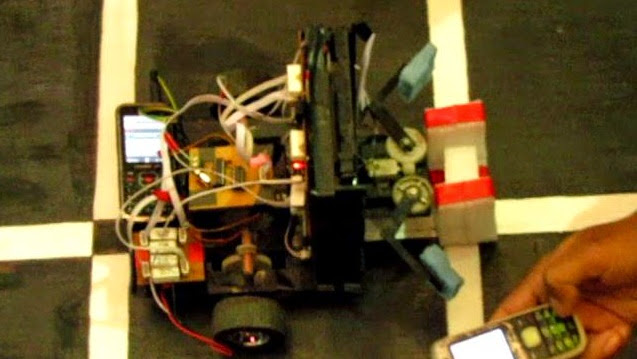Create two arrays in addition to the input array. One is
the DP array, and one is the path array. dp[i][j] = in[i][j] +
min(dp[i-1][j-1], dp[i][j-1], dp[i+1][j-1]). Make sure that you wrap
around the top and bottom of the matrix (use modulo, or just an if
statement).
For the path, you must keep an array of strings (or whatever you like)
to hold the current path to that point. Prefer lexicographically shorter
paths when two DP cells have the same value. Note that
lexicographically shorter in this problem means that you minimize the
row number, and not the ASCII value of the string. For example:
1 10 10 10
1 2 3 4
In ASCII terms, and normal string comparison terms, the first string is
lexicographically earlier. But in this problem, they want the latter.
Remember it does not matter you from left to right or right to left.
CODE:
#include<stdio.h>
#define MIN(a,b) a<b? a:b
#define maxe 1<<30
int p[11][101],r,c;
int main(){
int i,j,rp;
long long a[11][101],tmp,min,f;
while(scanf("%d %d",&r,&c)!=EOF){
for(i=0;i<r;i++)
for(j=0;j<c;j++)
scanf("%lld",&a[i][j]);
for(j=c-2;j>=0;j--)
for(i=0;i<r;i++){
tmp=a[i][j];
rp=i-1;
if(rp<0)rp=r-1;
a[i][j]=tmp+a[rp][j+1];
p[i][j]=rp;
rp=i;f=1;
if(a[i][j]>tmp+a[rp][j+1]||(a[i][j]==tmp+a[rp][j+1]&&i==0)){
a[i][j]=tmp+a[rp][j+1];
p[i][j]=rp;
f=0;
}
rp=i+1;
if(rp==r)rp=0;
if(a[i][j]>tmp+a[rp][j+1]||(a[i][j]==tmp+a[rp][j+1]&&i==0&&f)||(a[i][j]==tmp+a[rp][j+1]&&i==r-1)){
a[i][j]=tmp+a[rp][j+1];
p[i][j]=rp;
}
}
min=maxe;
for(i=0;i<r;i++){
if(min>a[i][0]){
min=a[i][0];
rp=i;
}
}
for(j=0;j<c;j++){
printf("%d",rp+1);
if(j<c-1)printf(" ");
rp=p[rp][j];
}
printf("\n%lld\n",min);
}
}
In this blog I will share some article on microcontrller and different types of programming.

Wednesday, May 16, 2012
Tuesday, January 31, 2012
UVA 701 Exclusive solution
<script type="text/javascript">
ch_fluidH = 1;
ch_nump = "4";
ch_client = "faltu";
ch_width = 550;
ch_height = "auto";
ch_type = "mpu";
ch_sid = "Chitika Default";
ch_color_site_link = "0000CC";
ch_color_title = "0000CC";
ch_color_border = "FFFFFF";
ch_color_text = "000000";
ch_color_bg = "FFFFFF";
</script>
<script src="http://scripts.chitika.net/eminimalls/amm.js" type="text/javascript">
</script>
Let P denotes the prefix, T denotes the # of lost digits. We are searching for N, that the prefix of 2^N is P.
We have an inequlity of
P*10^T <= 2^N < (P+1)*10^T
thus log2(P*10^T) <= log2(2^N) < log2((P+1)*10^T),
which is log2(P)+T*log2(10) <= N < log2(P+1)+T*log2(10).
Also, we know that P < 10^(T-1),
that is T > log10(P)+1.
Then, we can brute force on T and find the minmum N.
We have an inequlity of
P*10^T <= 2^N < (P+1)*10^T
thus log2(P*10^T) <= log2(2^N) < log2((P+1)*10^T),
which is log2(P)+T*log2(10) <= N < log2(P+1)+T*log2(10).
Also, we know that P < 10^(T-1),
that is T > log10(P)+1.
Then, we can brute force on T and find the minmum N.
#include<iostream>
#include<stdio.h>
#include<math.h>
using namespace std;
long double ab(long double prf ){
long double lo,up,f,t;
lo=log2l(prf);
up=log2l(prf+1);
f=log2l(10);
t=ceill(log10l(prf+0.5))+1;
for (; ceill(lo+t*f) != floorl(up+t*f); t += 1) {}
return ceill(lo+t*f);
}
int main(){
long double prf;
while(cin>>prf){
printf("%lld\n",(long long)ab(prf));
}
return 0;
}
Sunday, January 22, 2012
LightOJ 10047 solution & CPP code
Its a dp problem.
Keep on counting minimum possible cost for each position. Use previous value to avoid calculating same thing again and again.
Keep on counting minimum possible cost for each position. Use previous value to avoid calculating same thing again and again.
#include<stdio.h>
#define MIN(a,b) a<b? a:b
#define inf 99999999
int main()
{
int fc,cost[22][5],a[22][5],i,j,n,t,kase,x,y;
scanf("%d",&t);
kase=0;
while (kase++<t)
{
scanf("%d",&n);
for (i=1;i<=n;i++)
for (j=1;j<=3;j++)
scanf("%d",&a[i][j]);
cost[1][1]=a[1][1];
cost[1][2]=a[1][2];
cost[1][3]=a[1][3];
for (i=2;i<=n;i++)
{
cost[i][1]=cost[i-1][2]+a[i][1];
cost[i][1]=MIN(cost[i][1],cost[i-1][3]+a[i][1]);
cost[i][2]=cost[i-1][1]+a[i][2];
cost[i][2]=MIN(cost[i][2],cost[i-1][3]+a[i][2]);
cost[i][3]=cost[i-1][2]+a[i][3];
cost[i][3]=MIN(cost[i][3],cost[i-1][1]+a[i][3]);
}
fc=inf;
for (i=1;i<=3;i++)
fc=MIN(fc,cost[n][i]);
printf("Case %d: %d\n",kase,fc);
}
return 0;
}
Saturday, January 21, 2012
UVA 10446 solution & C++ code
ALGORITHM:
This is an DP problem.
Rather than calculating the value for a particular n and back u store it and when needed dont recalculte.
This is an DP problem.
Rather than calculating the value for a particular n and back u store it and when needed dont recalculte.
#include<stdio.h>
unsigned long long dp[70][70];
int ini()
{
for (int i=0;i<70;i++)
for (int j=0;j<70;j++)
dp[i][j]=-1;
return 0;
}
unsigned long long trib(int n,int back)
{
if(n<=1)return 1;
if (dp[n][back]!=-1)return dp[n][back];
dp[n][back]=1;
for (int i=1;i<=back;i++)
{
dp[n][back]+=trib(n-i,back);
}
return dp[n][back];
}
int main(void)
{
int n,back,kase=1;;
while (1)
{
scanf("%d%d",&n,&back);
if (n>60)break;
ini();
printf("Case %d: %llu\n", kase++,trib(n,back));
}
return 0;
}
Subscribe to:
Posts (Atom)